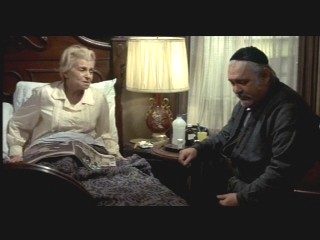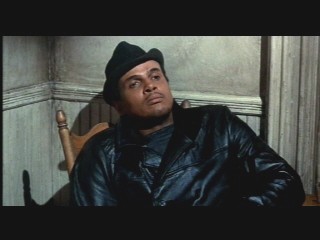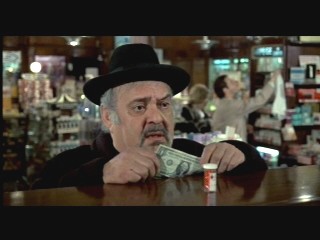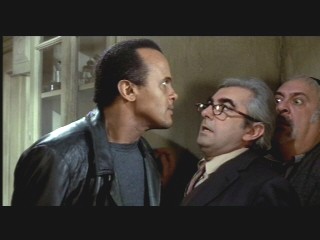
|
|
|
|
|
|
|
|
|
|
|
|
|
(1970) Director: Ján Kadár
So tell me... what on earth would you do if one night, a stranger not only appeared out of nowhere in your kitchen, but claimed that he was an angel sent by God to help you? Most likely you would regard that person as not only crazy but as a possible threat, even if like old Morris Mishkin you have been immersed in a religious environment all of your life. As a conservative Jew, Morris is in fact more sceptical of his stranger's claims than you might think. The stranger claims he's not only Jewish, but an angel - but you can't blame Morris for having doubts about this despite claiming an ethnic name to boot. That's because not only does this stranger happen to be black, but his behavior seems strongly unangel-like, sporting a leather jacket and occasionally using words that might charitably be called "salty". Yet at the same time, this meshugeh can not only correctly chant the Jewish blessing for bread (and with a good accent!), but happens to be circumcised... or at least claims to be, thank goodness. It's still circumstantial evidence, so Morris then next asks what we would probably ask: Make a miracle. ("Make a flood of seltzer! Fill the ice box full of halfah!") But Levine says it doesn't work that way; made an angel just after dying as a mortal just recently, he's currently "on probation", and the only way Morris can get his miracle is to believe in him first. It's always something with the spiritual force (or
forces) out there that refuses to give us instant irrefutable proof,
isn't it? I sometimes can't help Probably not, but even then, and even if you don't happen to believe in any spiritual force, it can be endlessly fascinating to choose any particular spiritual belief and think about not just what it supposedly asks of the human race, but why it asks us those things. It seems apt that my reaction to The Angel Levine was just like how I find thinking about spiritual matters; sometimes frustrating, sometimes wishing that I had more of substance to chew on, but still finding the experience an interesting distraction. However, I still hesitate giving it a general recommendation, since I know this often murky subject matter is not everyone's cup of tea. In fact, the movie has long had a tough time finding a sizable receptive audience. An adaptation of a short story by author Bernard Malamud (who wrote The Natural) and produced by co-star Harry Belafonte, it was a big flop upon its theatrical release, and languished in near-obscurity for the next thirty plus years until recently, when MGM out of the blue released it on tape and DVD (the latter of which in an absolutely gorgeous transfer.) Though there's now free access to the movie, the road ahead to acceptance still may not be so easy, one other reason being the situation that the movie begins with may be considered too "depressing" by some. Such people actually would have some legitimate argument for their opinion; when the central character proclaims within the first few minutes, "I don't want to live anymore. I know it's a sin to talk that way, but the hurt in me is so great, I want to scream" - well, it's pretty obvious that the movie is unlikely to be a barrel of laughs. This central character is Morris Mishkin (Mostel, The
Producers), a Jew living in New Yorker who has indeed come to
the end of his rope. So many bad things Actually, this question never gets answered in a 100% clear way, though I personally felt that by the end of the movie there had been enough circumstantial evidence presented throughout to let me confidently choose one of those two possibilities. Still, I wouldn't blame any viewer who, by the end of the movie, still finds himself utterly perplexed concerning this question. The Angel Levine does not follow any familiar, cookie cutter-like narrative device. It does not stand still at any moment to explain something in detail; instead, many scenes require us to recall what little evidence we might already have on hand in combination with what we see happening in front of us right at that moment in order to determine what's happening. Not only that, there are many other cryptic scenes presented with no clues at hand; not only do we have to put aside our confusion about any such scene for the time being, we then have to try and look at what is happening in more than one viewpoint, so that later on we might have more of an inkling of what happened. Though I found watching The Angel Levine overall worthwhile, at the same time I would understand anyone finding it a frustrating experience; I can't deny I experienced such a feeling at times. The wordless finale, consciously arty in a student film sort of way, initially felt so vague and unfinished that I felt like shouting, "That's it?!?" at the screen. It was only some time later, after some quiet and lengthy mulling, that enough pieces came together in my mind to give me the explanation about what all of that strangeness was actually saying. Czech director Ján Kadár (who directed the Oscar-winning
The Shop On Main Street) wasn't known for
dealing with subject matter in a straightforward and familiar manner,
and this effort (his first American movie, Kadár's direction also comes across as excessively stagy, but with most of the movie taking place in Morris' tiny apartment, he really can't be blamed for that. But despite this and those other times when he genuinely stumbles - which he might be excused for, suddenly finding himself free to roam after years working in a state-controlled film system - Kadár does understand the heart of The Angel Levine. While the movie may have more than its share of weaknesses, Kadár at least knows that the strength and focus of this particular story is with the characters. He knows that Morris, who is the central character of all this, has to be someone we can willingly stick with for over 100 minutes, but at the same time he doesn't make the common movie cliché of making the personality of the movie's protagonist totally palatable. Morris isn't a bad man, and there is a lot to like about him; we see how much he truly loves his Fanny in several touching moments, and there is a great scene where he and Fanny recall their courtship. But another time he get furious and yells at the ill Fanny when he learns she volunteered his services without consulting him first, and he has also freely cut off contact from his daughter. Still, knowing his dire circumstances and what his faith dictates, you can begin to understand whenever he does something we might not approve of. There are also some nice little touches here and there that further flesh him out. Although he has lost his faith, we see him still wearing his yarmulke for much of the movie - evidently, there is still some part of him that wants to believe. Even with the screenplay and the direction doing so much
to create Morris Mishkin, one cannot look over Mostel's performance as
him. Playing a man who is at * As soon as I finished typing that last sentence, my telephone rang. Upon answering it I heard a smacking sound, followed by a gruff-sounding individual saying, "I am such a stupe!" just before he put down the phone at his end.
Check for availability on Amazon (VHS) See also: When The Wind Blows, The Wonderful Ice Cream Suit, Your Three Minutes Are Up |
 but wonder at times
if deep down it has a perverse sense of humor concerning our struggles
to try and understand it. Although I can't claim to be well-versed in
any particular religion, I sometimes wonder a lot about certain
spiritual questions that I think even long-time devoted followers might
have problems answering. It seems strange that if there is some kind of
formidable spiritual force out there that wants our attention, why
existing circumstances make establishing a relationship so difficult.
For example, while I can more or less understand why a God would not
want robots as followers and would want us to devote to Him out of free
will, I don't understand why He wouldn't highlight with irrefutable
proof the "true path" for us to take; this way we wouldn't get confused
by other misleading paths should we indeed decide we want to follow God
and make Him happy. For that matter, if there is indeed a Devil who
tries to get people away from God, why does he choose to have all his
followers one way or the other eventually end up in eternal damnation
and misery? Wouldn't it make more sense to both leave them in peace and
reward their worship, and as a result be able to happily bask from the
love and worship from a legion of loyal and happy followers?(
but wonder at times
if deep down it has a perverse sense of humor concerning our struggles
to try and understand it. Although I can't claim to be well-versed in
any particular religion, I sometimes wonder a lot about certain
spiritual questions that I think even long-time devoted followers might
have problems answering. It seems strange that if there is some kind of
formidable spiritual force out there that wants our attention, why
existing circumstances make establishing a relationship so difficult.
For example, while I can more or less understand why a God would not
want robots as followers and would want us to devote to Him out of free
will, I don't understand why He wouldn't highlight with irrefutable
proof the "true path" for us to take; this way we wouldn't get confused
by other misleading paths should we indeed decide we want to follow God
and make Him happy. For that matter, if there is indeed a Devil who
tries to get people away from God, why does he choose to have all his
followers one way or the other eventually end up in eternal damnation
and misery? Wouldn't it make more sense to both leave them in peace and
reward their worship, and as a result be able to happily bask from the
love and worship from a legion of loyal and happy followers?( have happened to him in the past
few months; his daughter married outside the faith and is therefore
"dead" to him, his wife Fanny has become extremely ill and is now
confined to her bed at all times, he was inadequately insured for the
fire that burned down his tailor shop, and his bad back prevents him
from working anywhere, so there is no money coming in. "I don't
understand why God has turned against me," he laments to his doctor
friend Arnold (Milo O'Shea of Oz) "At least if I was able to
understand... He's finishing me." This particular day, Morris' problems
don't quit after he comes home after spending the afternoon struggling
with the bureaucracy at the welfare department; Fanny soon takes a turn
for the worst and seems to be in her final moments. It is right then
that mysterious black man (Belafonte, of course) appears in Morris'
kitchen, claiming he is a new angel after being recently deceased, and
has been sent by The Powers That Be (with Morris giving the inevitable
guess that this man is from the welfare department.) Telling Morris
that his name is Alexander Levine, he says he is here to help. But if
he's an angel, he's a strange one, not just for those reasons earlier
mentioned. Though seemingly sincere, this angel not only uses Morris'
apartment as a place to try and win over an ex-girlfriend (Gloria
Foster, The Matrix) from his past life, but seems to
have more than his share of self-doubt. Is Levine really an angel, or
is he instead deranged and/or trying to hustle Morris?
have happened to him in the past
few months; his daughter married outside the faith and is therefore
"dead" to him, his wife Fanny has become extremely ill and is now
confined to her bed at all times, he was inadequately insured for the
fire that burned down his tailor shop, and his bad back prevents him
from working anywhere, so there is no money coming in. "I don't
understand why God has turned against me," he laments to his doctor
friend Arnold (Milo O'Shea of Oz) "At least if I was able to
understand... He's finishing me." This particular day, Morris' problems
don't quit after he comes home after spending the afternoon struggling
with the bureaucracy at the welfare department; Fanny soon takes a turn
for the worst and seems to be in her final moments. It is right then
that mysterious black man (Belafonte, of course) appears in Morris'
kitchen, claiming he is a new angel after being recently deceased, and
has been sent by The Powers That Be (with Morris giving the inevitable
guess that this man is from the welfare department.) Telling Morris
that his name is Alexander Levine, he says he is here to help. But if
he's an angel, he's a strange one, not just for those reasons earlier
mentioned. Though seemingly sincere, this angel not only uses Morris'
apartment as a place to try and win over an ex-girlfriend (Gloria
Foster, The Matrix) from his past life, but seems to
have more than his share of self-doubt. Is Levine really an angel, or
is he instead deranged and/or trying to hustle Morris? incidentally) is no
exception. Some of his touches are typical for this era of film
experimentation, like when the movie suddenly switches to black and
white a couple of times before going back to color. Other touches are
more unique, though unfortunately for the most part they are not only
embarrassing to witness today, the few people who saw the movie at the
time probably weren't that much more accepting of them. The
introduction of Levine into the movie is probably the worst of these
particular moments, with the camera quickly zooming into this figure
who has come out of nowhere, along with a shrieky heavenly choir.
Unfortunately this isn't Kadár's only use of sour sounds on the
soundtrack; a number of other scenes have that ungodly-sounding choir
yelping loudly in the background, not only distracting us from what is
actually happening, but bringing the movie dangerously close to the
realm of parody. A few other times, Kadár himself seems unsure of the
subject matter; the drugstore incident and the subplot concerning
Levine trying to rehook with his ex-girlfriend, for example, not only
dissolve completely before they can finish, but the little (if
anything) derived from these scenes by no means deserved all the screen
time they did manage to end up with.
incidentally) is no
exception. Some of his touches are typical for this era of film
experimentation, like when the movie suddenly switches to black and
white a couple of times before going back to color. Other touches are
more unique, though unfortunately for the most part they are not only
embarrassing to witness today, the few people who saw the movie at the
time probably weren't that much more accepting of them. The
introduction of Levine into the movie is probably the worst of these
particular moments, with the camera quickly zooming into this figure
who has come out of nowhere, along with a shrieky heavenly choir.
Unfortunately this isn't Kadár's only use of sour sounds on the
soundtrack; a number of other scenes have that ungodly-sounding choir
yelping loudly in the background, not only distracting us from what is
actually happening, but bringing the movie dangerously close to the
realm of parody. A few other times, Kadár himself seems unsure of the
subject matter; the drugstore incident and the subplot concerning
Levine trying to rehook with his ex-girlfriend, for example, not only
dissolve completely before they can finish, but the little (if
anything) derived from these scenes by no means deserved all the screen
time they did manage to end up with.  least ten years older
than his actual age, Mostel is Morris Mishkin, giving Morris an
utter weariness to his walk and voice, a sense of being around the
block many times that someone in this situation in real life would
inevitably have. And it while it may seem unlikely that this aged
conservative Jew could hold his own when more or less forced to
interact with a black street hustler - who claims he just became
an angel, no less - Mostel finds the remaining strength hidden in this
worn-out man to stay determined to his feelings. Of course, in order
for this atypical relationship and banter to work, the character of
Levine needed to be strong in his own right. Belafonte at the time of
filming was at an age (43) much greater than you'd expect for a
hustler-type, and his main forté wasn't in acting. Despite this, he
manages to do pretty well, being appropriately pushy (though never in a
mean-spirited way) whenever he finds Morris' stubbornness pushing
him in turn. His character has more than his share of faults, but
Belafonte in the end manages to make Levine sympathetic, in part due to
a well-done monologue when Levine realizes how he wasted his life. Both
Levine and Morris are two characters with enough personality and life
experiences that even when The Angel Levine is
especially obtuse, these fellows are still there to give us some good
cheer.
least ten years older
than his actual age, Mostel is Morris Mishkin, giving Morris an
utter weariness to his walk and voice, a sense of being around the
block many times that someone in this situation in real life would
inevitably have. And it while it may seem unlikely that this aged
conservative Jew could hold his own when more or less forced to
interact with a black street hustler - who claims he just became
an angel, no less - Mostel finds the remaining strength hidden in this
worn-out man to stay determined to his feelings. Of course, in order
for this atypical relationship and banter to work, the character of
Levine needed to be strong in his own right. Belafonte at the time of
filming was at an age (43) much greater than you'd expect for a
hustler-type, and his main forté wasn't in acting. Despite this, he
manages to do pretty well, being appropriately pushy (though never in a
mean-spirited way) whenever he finds Morris' stubbornness pushing
him in turn. His character has more than his share of faults, but
Belafonte in the end manages to make Levine sympathetic, in part due to
a well-done monologue when Levine realizes how he wasted his life. Both
Levine and Morris are two characters with enough personality and life
experiences that even when The Angel Levine is
especially obtuse, these fellows are still there to give us some good
cheer.